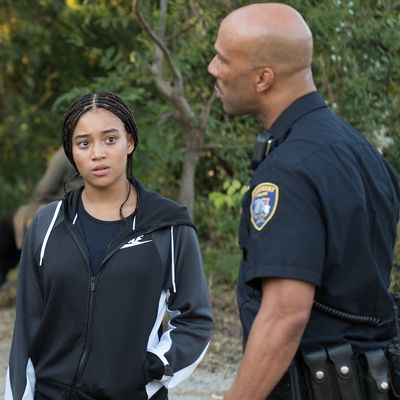
The Hate U Give opens with a father giving his children The Talk — not the birds and the bees, but the heartbreaking one parents of black children eventually must have about how not to get killed by the police. It’s a scene we’ve seen a few versions of at the movies this year, and a scene we will likely see many more times in the coming years, and isn’t any less emotionally charged for that. But the fact that The Hate U Give, based on the novel by Angie Thomas, opens with it rather than building up to it, tells you something about how much it’s ready to unpack over its dense, almost consistently compelling two-plus hours. At its heart, it’s the story of one girl internalizing the threat of racial violence that shapes every aspect of her life. The Talk is the ground floor, and director George Tillman Jr. and writers Audrey Wells and Tina Mabry let a hundred more questions and debates grow out of it.
The father is Maverick Carter (a mighty and heartfelt Russell Hornsby), and the middle child is Starr (Amandla Stenberg), who we catch up with some seven years later as a teenager. She lives with her parents and two siblings in Garden Heights, a poor black neighborhood in an unspecified city in the southern United States. Maverick is a reformed drug dealer who now runs a local corner shop; her mother Lisa (Regina Hall) works at the hospital. In a heavily voiced-over opening act that I suspect is largely lifted from Thomas’s novel, Starr introduces us to her world, and the different forces that operate within it: the local businesses and characters, the gangbangers (led by a stony, menacing Anthony Mackie), and the kids she’s grown up with since she was a baby.
Contrasting — quite literally — with all this is Starr’s school life. Due to an incident at her local high school that is not immediately made clear to us, Maverick and Lisa have sent their children to a largely white, affluent private high school. She’s seen stuffing her hoodie in her bag and kissing her white boyfriend (K.J. Apa) and deflecting her classmates efforts to be “down” with her. Starr’s code-switching could provide plenty of material for a novel on its own, but it’s very internal stuff for a mainstream film to tackle, and the narration Wells and Mabry depend on in this section borders on overkill. There are visual cues, as well: When Starr is at school, the light temperature goes almost comically cool, as if the rich neighborhood isn’t merely on the other side of town but in a different weather system altogether. The effect is that of an environment devoid of warm-blooded empathy; it also has the side effect of making everyone, including Starr, look whiter.
Starr is more or less able to reconcile these two modes of her life, albeit with some uneasiness. But everything is turned upside down when, after a party that turns violent, she and her childhood friend and crush Khalil (Algee Smith) are stopped in his car by a police officer. Starr has had this situation drilled into her from childhood, but Khalil is less willing to put his head down and hands on the dash. Tillman’s direction here is so crisp and effective and heartbreaking, a barrage of life-or-death moments that flash by with utter clarity in the rush of adrenaline. And the unbearably tense scene ends in tragedy.
The rest of the film deals with the aftermath of Khalil’s killing — in her two communities, and in Starr’s own heart. There are many moments that seek to underline the increasing differences in the two worlds Starr inhabits, but the one that I found most haunting comes well along in her radicalization, after she has posted an image of Emmett Till on her Tumblr page. (While other films use social media as shorthand for a mob energy either for good or ill will, The Hate U Give is better at fleshing out the ways in which a thing someone posts or likes can be incredibly formative, especially during adolescence.) Starr gets a call from her boyfriend, and as she picks up her phone, the focus shifts and K.J. Apa’s CW smile shines from the caller ID over Till’s bloated, disfigured face. There are images that are simply foreign to her classmates, no matter how much of a good, not-all-white-boys boy Chris is.
Amandla Stenberg in real life has been a forceful young voice for social justice, which is why her performance as Starr is surprising at first: methodical and withdrawn throughout so much of the grieving and thinking process, taking in everything around her, measuring it against her own feelings and experience. For much of the film, Starr is a person that watches things, not a person that makes things happen, or that things really directly happen to. But when she finally decides to invest herself in the fight for justice for Khalil, Stenberg becomes a force of nature, and the film has done such a good job of emphasizing all that is at stake for her that her performance is all the more earned and real.
Again, there are so many movies that have tackled the territory that The Hate U Give deals with — “same story, another name,” says Issa Rae’s activist lawyer during the memorial service for Khalil. There will likely be many more, but the how of Tillman, Mabry, and Wells’s telling distinguishes their story. The Hate U Give should be an epic, and it is: Yes, it’s a teen melodrama, but it’s also an elegantly constructed piece of world-building, a love story, a family history, a sociological spiderweb of cause and effect of the hate referenced in the Tupac-coined titled. If this is what the next wave of YA adaptation will feel like, we are in a good place.

